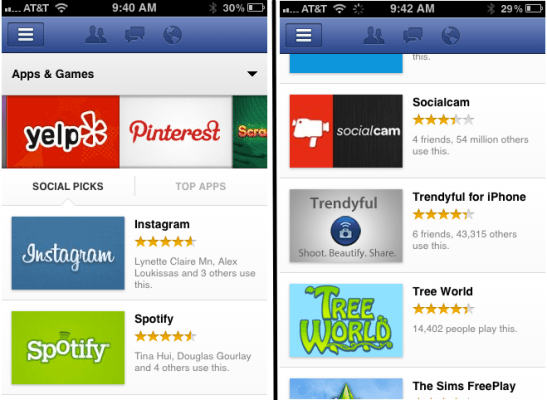Facebook says that today 220 million people are visiting its App Center every month, with 40% likely to return the day after they use it for more. But with thousands of apps available, and visitors looking for guidance on what apps to use, recommendation is a huge part of the equation both for consumers, and for developers hoping their apps are the ones to hit the big time. Today, Facebook took a step towards demystifying how all this works in a blog post explaining the building of the recommendation engine.
The bottom line, write the three engineers Wei Xu, Xin Liu, TR Vishwanath who worked on the engine, is “quality and personalization, instead [of] editorialization.” Linking app usage into a person’s social graph, they write, helps the recommendation engine “learn” how which apps might be best suited to a particular individual. Algorithms for “candidate selection”, “scoring and ranking”, and “real-time updates” of the apps sit alongside possibly more recognisable metrics around daily active usage and basic user ratings.
But in a fairly technically-minded essay, here’s what stands out to me that is interesting:
- It’s a huge contrast to other app stores — such as those from Apple and Google, not only in its use of social algorithms in helping recommend apps to users, but also in how it’s attempting to articulate how it works.
- And, I can’t help but wonder if this is the kind of data that Facebook could potentially reuse for a wider search product down the line, a move that people have wondered if Facebook would try as it grew bigger, and looked for more routes to user engagement and advertising. As the engineers note, “the system follows an aggregator-leaf architecture—very similar to that of a search engine.”
Looking at Facebook’s App Center recommendation as a template for search, you can see how Facebook could potentially create a product that is about big data — able to handle multiple streams of data, pare them down to those personalised and relevant to you — but also robust, and built for systems that may fail.
The engineers have also incorporated an element that is familiar to all app stores — user ratings — and has explained how it gets incorporated into apps’ rankings. Its system, the engineers note, randomly survey users to rate their apps, and those averages are used to give each app a “confidence adjustment.” It’s not clear whether these are any different from star ratings as noted in app stores, but because, in theory, they are tied to registered Facebook users, perhaps that makes them slightly harder to game, a persistent problem in stores like Google’s Play and Apple’s App Store.
The engineers also note that it has decided that taking averages of daily active users are a much better metric for how popular an app is — monthly active users can be “inflated” by spikes in activity, they write — that’s one to remember for when you next refer to AppData try to measure the popularity of certain apps on Facebook in the future.
